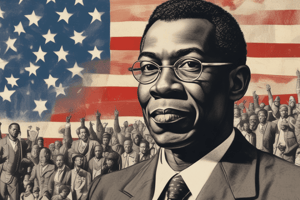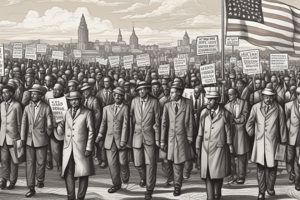Podcast
Questions and Answers
Which section of the Voting Rights Act specifically prohibits voting practices that discriminate based on race?
Which section of the Voting Rights Act specifically prohibits voting practices that discriminate based on race?
- Section 2 (correct)
- Section 5
- Section 4
- Section 1
What was the main objective of the Voting Rights Act enacted in 1965?
What was the main objective of the Voting Rights Act enacted in 1965?
- To lower the voting age to 18 years
- To introduce voting ID requirements
- To allow non-English speakers to vote without assistance
- To eliminate racial discrimination in voting (correct)
What significant change occurred as a result of the Shelby County v. Holder decision in 2013?
What significant change occurred as a result of the Shelby County v. Holder decision in 2013?
- It invalidated Section 4(b) of the Voting Rights Act (correct)
- It mandated bilingual voting materials
- It lowered the voting age to 16
- It strengthened the preclearance requirement
Which amendment to the Voting Rights Act extended bilingual voting materials requirements?
Which amendment to the Voting Rights Act extended bilingual voting materials requirements?
What is considered a contemporary issue related to the Voting Rights Act?
What is considered a contemporary issue related to the Voting Rights Act?
Flashcards are hidden until you start studying
Study Notes
Voting Rights Act
-
Overview:
- Enacted in 1965, aimed to eliminate racial discrimination in voting.
- A landmark piece of federal legislation in the United States.
-
Key Provisions:
- Section 2: Prohibits voting practices or procedures that discriminate based on race, color, or membership in a language minority group.
- Section 5: Required jurisdictions with significant racial discrimination histories to obtain federal approval before making changes to voting laws (preclearance).
- Voting Assistance: Mandates the provision of assistance for voters needing support, including language assistance for non-English speakers.
-
Historical Context:
- Response to systemic disenfranchisement of African Americans in the Southern states.
- Aimed to enforce the 15th Amendment, which grants the right to vote regardless of race.
-
Significant Amendments:
- Expanded protections and the scope of the Act over the years.
- 1970 Amendment: Lowered voting age to 18.
- 1982 Amendment: Extended bilingual voting materials requirements and made it easier for individuals to prove cases of discrimination.
-
Impact:
- Increased voter registration and participation among African Americans and other minority groups.
- Enhanced federal oversight of state election practices.
-
Judicial Challenges:
- The Supreme Court has reviewed the Act multiple times, leading to changes in its enforcement.
- 2013: Shelby County v. Holder decision invalidated Section 4(b), effectively nullifying the preclearance requirement.
-
Contemporary Issues:
- Ongoing debates regarding voter ID laws, gerrymandering, and access to polling places.
- Calls for the restoration and strengthening of provisions to address modern voting discrimination.
-
Legacy:
- Considered one of the most effective pieces of civil rights legislation.
- Continues to influence discussions on voting access and equity in the United States.
Voting Rights Act
- Enacted in 1965, the Voting Rights Act aimed to eliminate racial discrimination in voting.
- Key provisions of the Act include Section 2, prohibiting voting practices or procedures that discriminate based on race, color, or membership in a language minority group, and Section 5, which required jurisdictions with significant racial discrimination histories to obtain federal approval before making changes to voting laws (preclearance).
- The Voting Rights Act was a response to systemic disenfranchisement of African-Americans in the Southern states and aimed to enforce the 15th Amendment that granted the right to vote regardless of race.
- Amendments in 1970 and 1982 expanded protections and the scope of the Act, lowering the voting age to 18 and extending bilingual voting material requirements.
- The Act has significantly impacted voter registration and participation among African-Americans and other minority groups, as well as enhanced federal oversight of state election practices.
- Judicial challenges have led to changes in the Act's enforcement, including the 2013 Supreme Court decision in Shelby County v Holder that invalidated Section 4(b), effectively nullifying the preclearance requirement.
- Contemporary issues surrounding the Voting Rights Act include debates on voter ID laws, gerrymandering, and access to polling places, with calls for restoration and strengthening of provisions to address modern voting discrimination.
- The Voting Rights Act is considered one of the most effective pieces of civil rights legislation and continues to influence discussions on voting access and equity in the United States.
Studying That Suits You
Use AI to generate personalized quizzes and flashcards to suit your learning preferences.




